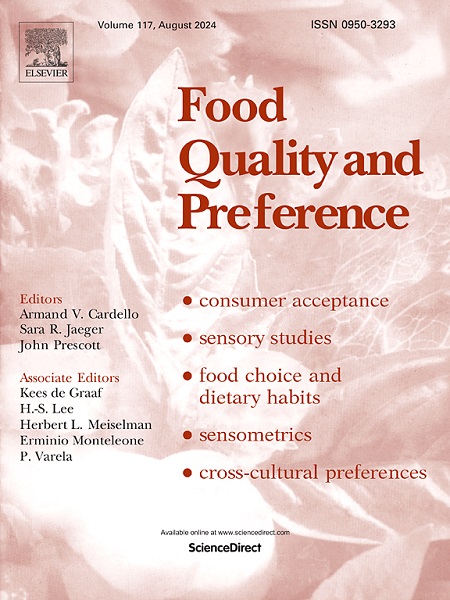The impact of climate claims on meat alternative adoption: The underlying mechanism of taste inferences and anticipated guilt
IF 4.9
1区 农林科学
Q1 FOOD SCIENCE & TECHNOLOGY
引用次数: 0
Abstract
The increasing adoption of meat alternatives can significantly contribute to animal welfare, human health, and environmental sustainability by reducing greenhouse-gas emissions from livestock production. While meat alternatives currently represent only a small fraction of the market compared to traditional meat, their growth is accelerating rapidly. Highlighting whether the product is environmentally friendly on packaging may serve as an effective strategy to accelerate its adoption. This research examines the impact of climate claims as a key influence, exploring how they shape taste inferences and anticipated guilt, ultimately driving consumers' willingness to adopt meat alternatives. An experiment employing a one-factor between-subjects design tests the theoretical model with a representative sample of Austrian consumers. Data from this sample (N = 427) were analyzed with MANCOVA and mediation analysis. The data confirm the theoretical reasoning that climate claims stimulate taste inferences and, at the same time, reduce feelings of anticipated guilt. Both variables impact the adoption of meat-alternative products. However, the indirect effect of taste inferences was more substantial than the indirect effect of anticipated guilt. This study is the first to show that taste inferences and anticipated guilt are underlying processes that explain how climate claims for meat alternatives impact their adoption by consumers. The findings contribute to the ongoing debate on the effectiveness of claims and provide theoretically derived explanations of why a climate claim impacts consumer responses positively in the context of a plant-based diet.
气候声明对肉类替代品采用的影响:味觉推断和预期内疚的潜在机制
越来越多地采用肉类替代品可以通过减少牲畜生产产生的温室气体排放,对动物福利、人类健康和环境可持续性做出重大贡献。虽然与传统肉类相比,肉类替代品目前只占市场的一小部分,但它们的增长正在迅速加速。在包装上强调产品是否环保,可以作为加速产品采用的有效策略。这项研究考察了气候声明作为一个关键影响因素的影响,探索它们如何塑造味觉推断和预期的内疚,最终推动消费者愿意采用肉类替代品。采用单因素受试者间设计的实验用奥地利消费者的代表性样本检验了理论模型。对该样本(N = 427)的数据进行MANCOVA分析和中介分析。这些数据证实了理论推理,即气候声明刺激了味觉推断,同时减少了预期的内疚感。这两个变量都会影响肉类替代品的采用。然而,味觉推断的间接影响比预期内疚的间接影响更为显著。这项研究首次表明,味觉推断和预期内疚是解释肉类替代品的气候声明如何影响消费者采用它们的潜在过程。这些发现有助于对声称有效性的持续辩论,并从理论上解释了为什么气候声称会在植物性饮食的背景下对消费者的反应产生积极影响。
本文章由计算机程序翻译,如有差异,请以英文原文为准。
求助全文
约1分钟内获得全文
求助全文
来源期刊

Food Quality and Preference
工程技术-食品科技
CiteScore
10.40
自引率
15.10%
发文量
263
审稿时长
38 days
期刊介绍:
Food Quality and Preference is a journal devoted to sensory, consumer and behavioural research in food and non-food products. It publishes original research, critical reviews, and short communications in sensory and consumer science, and sensometrics. In addition, the journal publishes special invited issues on important timely topics and from relevant conferences. These are aimed at bridging the gap between research and application, bringing together authors and readers in consumer and market research, sensory science, sensometrics and sensory evaluation, nutrition and food choice, as well as food research, product development and sensory quality assurance. Submissions to Food Quality and Preference are limited to papers that include some form of human measurement; papers that are limited to physical/chemical measures or the routine application of sensory, consumer or econometric analysis will not be considered unless they specifically make a novel scientific contribution in line with the journal''s coverage as outlined below.
 求助内容:
求助内容: 应助结果提醒方式:
应助结果提醒方式:


